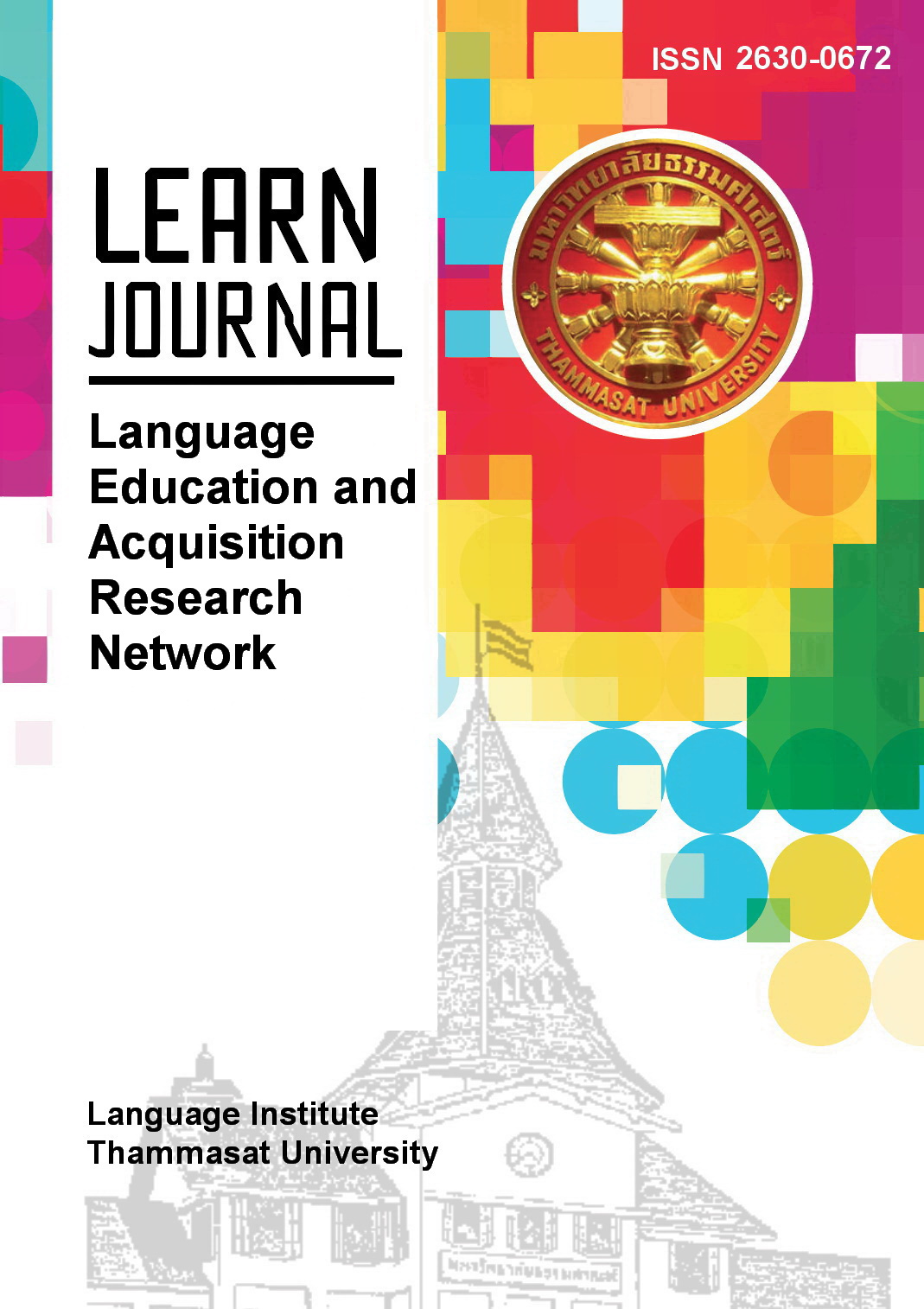University Students’ Perspectives Towards Using Survey Project Work in English for Science and Technology Courses
Main Article Content
Abstract
Many benefits of using project work in English language classrooms have been shown in several studies. Students could develop their language skills, collaborative skills, research skills and other skills that they can apply in their future jobs. The aim of this present study is to investigate the benefits that university students gained as well as the difficulties they faced when learning English for Science and Technology courses through survey project work. The participants were 93 undergraduate students from the Faculty of Science and Technology and other faculties studying at a university in Thailand. Both quantitative and qualitative data were collected from a questionnaire and from students’ reflections. The study showed that the students had good attitudes towards learning by doing a survey project. They revealed its benefits in terms of improving language skills, especially speaking skills. The students also agreed that they were more responsible, had developed their learner autonomy, and had improved research skills and other useful skills connecting them to the real world. Regarding their difficulties, they responded that they had problems with time management and lacked collaboration from some team members when doing survey project work. The results of this study could help teachers to employ this method in their classes systematically and successfully.
Article Details
References
Agustina, T. (2014). English for Specific Purposes (ESP): An approach of English teaching for non-English department students. Beta: Jurnal Tadris Matematika, 7(1), 37-63.
https://jurnalbeta.ac.id/index. php/betaJTM/article/view/43
Alan, B., & Stoller, F. L. (2005). Maximizing the benefits of project work in foreign language classrooms. English teaching forum, 43(4), 10-21.
English Language Learning Studio. (2018, March 12). Project-based learning. https://englishlanguagelearningstudio.wordpress.com/2018/03/12/project-based-learning/
Essien, A. M. (2018). The effects of project-based learning on students’ English language ability. The 2018 International Academic Research Conference in Vienna (pp. 438-443).
Grant, M. M. (2002). Getting a grip on project-based learning: Theory, cases and recommendations. Meridian: A middle school computer technologies journal, 5(1), 83-99.
Gülbahar, Y., & Tinmaz, H. (2006). Implementing project-based learning and e-portfolio assessment in an undergraduate course. Journal of Research on Technology in Education, 38(3), 309-327.
Haines, S. (1989). Projects for the EFL classroom. Thomas Nelson and Sons Ltd
Hasni, A., Bousadra, F., Belletête, V., Benabdallah, A., Nicole, M.-C., & Dumais, N. (2016). Trends in research on project-based science and technology teaching and learning at K–12 levels: A systematic review. Studies in Science Education, 52(2), 199-231. https://doi.org/10.1080/03057267.2016.1226573
Hutchinson, T. (1996). Project work in language learning. The Language Teacher, 20(9). https://jalt-publications.org/tlt/articles/2044-project-work-language-learning
Jansing, B. (2011). Project work in the EFL classroom. Retrieved January 11 from https://www.iaawiki.tu-dortmund.de/index.php?title=Projec t_Work_in_the_EFL_Classroom
Keleş, Y. (2017). The effects of project work presentations on English speaking skill. Global Science Research Journals, 5(3), 577-580.
Khare, P. (n.d.). E-learning package on social studies teaching method. [Doctoral disseration, University of Allahabad].
Lee, T. S., & Tsai, H. J. (2004). The effects of business operation mode on market orientation, learning orientation and innovativeness. Industrial Management & Data Systems, 105(3), 325-348.
Legutke, M., Thomas, H., & Candlin, C. N. (1991). Process and experience in the language classroom. Routledge.
Lípová, T. (2008). Benefits of project work in English language teaching [Diploma thesis, Palacký University].
http://citeseerx.ist.psu.edu/viewdoc/download?doi=10.1.1.476.5091&rep=rep1&type=pdf
Mahrová, A. (2010). Project work in English classroom: The e-magazine [Master's thesis, Masaryk University].
Maskall, J., & Cotterell, S. (2011). A project-based approach to research skills development in first year undergraduates. Planet, 24(1), 22-29. https://doi.org/10.11120/plan.2011.00240022
Poth, R. D. (2016). Project-based learning: What it is and how it benefits students.https://www.easybib.com/guides/project-based-learnin g-benefits-students/
Sumarni, W. (2015). The strengths and weaknesses of the implementation of project based learning: A review. International Journal of Science and Research, 4(3), 478-484.
The Ministry of Education Singapore. (n.d.). Definition of project work. Retrieved January 11 from beta.moe.gov.sg/programmes/project-work/
Waldern, B. (2015, June 5). A student research project on learning English. KOTESOL. https://koreatesol.org/content/student-research-projec t-learning-english


